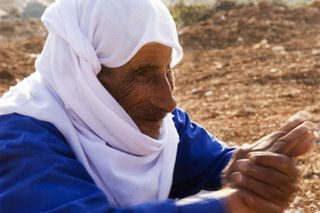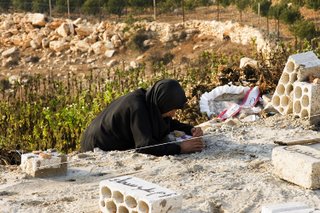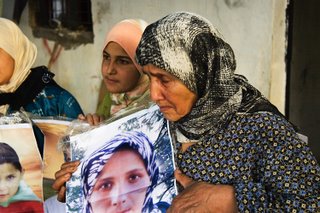"Nothing is safe [in Lebanon], as simple as that." Israeli Army Chief of Staff Dan Halutz, (Haaretz; Jul 13th, 2006)
The village of Marwahin hugs right up against the Israeli border. This intimacy does not make for good neighbors. On July 15th, 2006 the residents of Marwahin heard an announcement over loudspeakers from the Israeli military garrison that they had 2 hours to evacuate the village, or face the consequences. The villagers were trapped. Israeli tanks, armored personnel carriers, and army jeeps were poised on the south side of the village. On the hillside behind the village, Hizbullah fighters were spotted. Being Sunni, the villagers of Marwahin have long standing tensions with Shi’a Hizbullah organization. Taking the threat of an attack seriously, they immediately began to evacuate.
When we arrive in the village, we are invited to sit with a family who recount the events on that morning. They heard the announcements and with other families, they loaded a truck and several cars with men, women, and children and went to the nearby UN post, only to find the gate locked. They were not allowed to enter, and were told to return to the village. They decided to head to Tyre along the coastal road, but between the villages of Chamaa and Biyada the truck and a car was fired on by Israeli attack helicopter. The first missile missed its target, causing panic in the truck. Many of the children jumped down and began running. The next two rockets found their marks, 21 people were killed including 13 children and 2 pregnant women.
We walk to the outskirts of the village with a village elder who had lost family members in the attack. He insists on showing us the gravesite. When we arrive, we find an old woman curled up on the ground, holding one of the concrete markers and sobbing. “My sister”, says the old man. We sit with the man as he shows us the photos of those who were killed and buried together on the hilltop. Across the valley, on the very next hilltop, I watch a hummer leave the Israeli garrison and follow the border road on a patrol. I notice, in passing, that bombs had not destroyed a single Israeli home along the border. It is very quiet; the only sound is that of a grandmother crying.
Walking back to the village another elderly woman meets us and begins to tell us of her loss. She invites us to her daughter’s home, which has been partially destroyed by a fire. She explains that she is afraid to return to her home because of cluster bombs and the fact that the Israeli army is still operating in areas just outside the village, very near her home. She tells us that she lost her pregnant daughter (7 months), her son-in-law, and 6 of her grandchildren in the convoy attack. She says, “If they had not been killed in the convoy, they very well may have been killed inside their home.” The fire had gutted the family sleeping area.
She tells us that she lost her pregnant daughter (7 months), her son-in-law, and 6 of her grandchildren in the convoy attack. She says, “If they had not been killed in the convoy, they very well may have been killed inside their home.” The fire had gutted the family sleeping area.
We leave Marwahin as the blood red sun sets in the west. The yellow Hizbullah flags, so prominent in other villages in the south, are conspicuous in their absence, replaced by black mourning flags waving gently in the evening breeze. We descend to the valley below and the road north.
"Half Lebanon is destroyed. Is that a loss?" The Israeli Prime Minister, Ehud Olmert, fighting for his political life after failing to eliminate Hizbullah. (Haaretz; Sep 6th, 2006)
skip to main |
skip to sidebar


Whitehouse Arrest for Protesting the Occupation of Iraq (Sept 2005).



Sharon, Blair, Bush... Terrorists; Abu Dis (Mar 2005)

Balls to Walls; Abu Dis (Mar 2005)

Arrested Bringing a Coffin to Congress (Sept 2006)
All the universe is one bright pearl- we do not speak of two pearls or three pearls...your whole body is a radiant light. Your whole body is Mind in its totality...your whole body knows no hindrance. Everywhere is round, round, turning over and over.
Support My Work!

- Johnny
- i am a human rights activist, writer, photographer, and videographer. i have traveled to Afghanistan, Iraq, Lebanon, Jordan, Syria, and Palestine (the West Bank & Gaza), to bear witness and document the effects of war on communities and the struggle to retain human dignity in the face of oppression. i advocate for justice, reconciliation, and nonviolent strategies in the face of violence and oppression.

Whitehouse Arrest for Protesting the Occupation of Iraq (Sept 2005).



Sharon, Blair, Bush... Terrorists; Abu Dis (Mar 2005)

Balls to Walls; Abu Dis (Mar 2005)
Links

Arrested Bringing a Coffin to Congress (Sept 2006)
